

AQA B1 3.4 News story. AQA B1 3.6 Drugs in sport. Use of performance-enhancing drugs in the Olympic Games. These controls eventually evolved into a systematic-testing regimen that all Olympic athletes must adhere to.
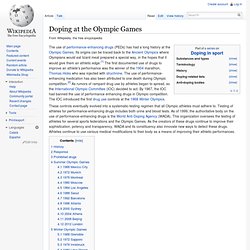
Testing of athletes for performance-enhancing drugs includes both urine and blood tests. As of 1999, the authoritative body on the use of performance-enhancing drugs is the World Anti-Doping Agency (WADA). This organization oversees the testing of athletes for several sports federations and the Olympic Games. As the creators of these drugs continue to improve their sophistication, potency and transparency, WADA and its constituency also innovate new ways to detect these drugs. Athletes continue to use various medical modifications to their body as a means of improving their athletic performances. History[edit] Should the use of performance enhancing drugs in sports be legalized? - Sports and Drugs - ProCon.org.
Doping in Amateur Cycling. Andrew Tilin Tilin, post-testosterone, near his home in Northern California.
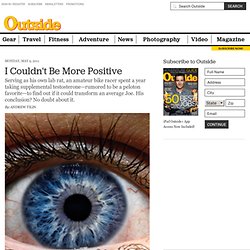
NOW I KNOW how Floyd Landis feels. A few years back, I had an idea for a magazine article: I'd profile an ordinary weekend athlete who cheats by taking performance-enhancing drugs. Although I found evidence of what I call citizen doping, I could never pin down someone who both fit the bill and would cooperate, so I decided to cut out the middleman and do the cheating myself. How Performance-Enhancing Drugs Work"
"If I could give you a pill that would make you an Olympic champion -- and also kill you in a year -- would you take it?
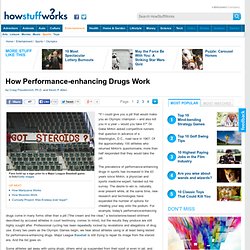
" Dr. Gabe Mirkin asked competitive runners that question in advance of a Washington, D.C., road race in 1967. Rio Olympics 2016: Russia escapes blanket ban by IOC: SMH. The Russian flag will be flying at the Summer Olympics in Rio de Janeiro after all, and the athletes from a nation mired in an ongoing drug scandal may be allowed to compete on the sporting world's largest stage.
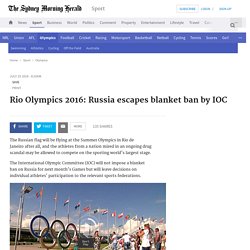
The International Olympic Committee (IOC) will not impose a blanket ban on Russia for next month's Games but will leave decisions on individual athletes' participation to the relevant sports federations. Russia doping scandal : The Guardian. Performance enhancing drugs in sport: The dark side of performance psychology: Australian Psychological Society : By Dr Jason Mazanov MAPS Senior Lecturer, School of Business, UNSW@ADFA Exploring the role of performance enhancing drugs (PED) in sport gives performance psychology an opportunity to look into its ‘dark side'.
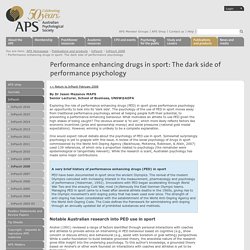
The psychology of the use of PED in sport moves away from traditional performance psychology aimed at helping people fulfil their potential, to preventing a performance enhancing behaviour. What motivates an athlete to use PED given the high stakes of being caught? The obvious answer is ‘to win', which more likely reflects factors like economic incentives (prize and sponsorship money) and social pressures (national gold medal expectations). However, winning is unlikely to be a complete explanation. DOSSIER tpe. [Thèse] Sport électronique, agressivité motrice et sociabilités - Nicolas Besombes. Abstract : This transdiciplinary work, at the intersection of motor praxeology, the sociology of sports and game studies, seeks to understand the phenomenon of “electronic sport” (Wagner, 2006; Taylor, 2012), using the fighting game Mortal Kombat X as its primary focus.
![[Thèse] Sport électronique, agressivité motrice et sociabilités - Nicolas Besombes](http://cdn.pearltrees.com/s/pic/th/electronique-sociabilites-188100133)
The first chapter of this dissertation examines the competitive video gaming practice under four objective and operational criteria commonly used to define a sport: the physicality, the organization of competitions, the regulatory system and the institutional device (Parlebas, 1999). In order to understand more clearly the characteristics shared by these two contemporary practices, our analysis is based on a qualitative methodology centered on direct observations during training and e-sport competitions (n = 9) and semi-directive interviews with amateurs, semi-professional gamers (n = 4) and with an organizer of competitive events (n = 1).
Guide de l'esport : présentation des joueurs, équipes, calendrier et moments clés des 14 jeux majeurs. Le guide esport 2019 Call of Duty : Black Ops 4 Counter-Strike : Global Offensive Dota 2 Dragon Ball FighterZ Fifa Fortnite Hearthstone League of Legends Overwatch Rainbow 6 : Siege Rocket League Starcraft II Street Fighter V.
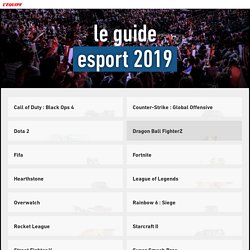
The State Of Esports In 2017. NBA: Esports is a massive industry, and we think we have a place in it. Nike has just done it - climbed into the political ring with the gloves off. Nike’s Kaepernick ad has some state officials trying to ban the brand. Nike’s new ad campaign featuring Colin Kaepernick sparked outrage among his critics, several of whom demanded a boycott of the brand and took to social media to share pictures of themselves burning its products.

In 2016, Kaepernick, then a member of the San Francisco 49ers, kneeled during the national anthem to draw attention to police killings in communities of color, a protest that critics (including Donald Trump) claimed was unpatriotic. By featuring Kaepernick in its campaign, Nike has positioned itself as an ally to him and, by extension, to the Black Lives Matter movement that shares his stance on policing. While overall the Kaepernick ad has been a success for Nike — sales jumped by 31 percent shortly after the new campaign debuted — some officials are taking their displeasure with it beyond sneaker burning, with troubling implications. A Louisiana mayor tried to ban all Nike products from city recreation centers. The NFL and a History of Black Protest. In 1944, Black activist and sportswriter Halley Harding, argued that “most persons, corporations or business almost always forget the people or incidents that made them big.”
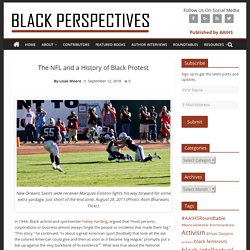
“This story,” he continued, “is about a great American sport [football] that took all the aid the colored American could give and then as soon as it became ‘big league,’ promptly put a bar up against the very backbone of its existence.” What was true about the National Football League (NFL) in 1944 is also true today. The NFL does not embrace its Black past. Colin Kaepernick to take a knee during national anthems no more. By Daniel Chaitin(@danielchaitin7)•3/3/17 12:32 PM Daniel Chaitin Senior Web Producer The Washington Examiner Learn more about Washington Examiner'sAlerts The Washington Examiner.
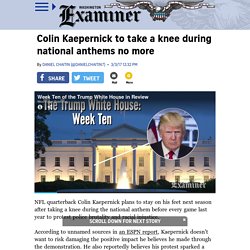
Eric Reid: Why Colin Kaepernick and I Decided to Take a Knee. The complicated relationship between sports and politics. A new study suggests serious sports fans are likely to show strong support for the U.S. military — a finding that could help explain why some Americans react negatively to athletes kneeling during the national anthem. The study does not specifically address sports fans’ opinions about the national anthem or athletes kneeling during it as a form of political protest. Colin Kaepernick explains why he sat during national anthem.
SANTA CLARA, Calif. -- San Francisco 49ers quarterback Colin Kaepernick has willingly immersed himself into controversy by refusing to stand for the playing of the national anthem in protest of what he deems are wrongdoings against African Americans and minorities in the United States. His latest refusal to stand for the anthem -- he has done this in at least one other preseason game -- came before the 49ers' preseason loss to Green Bay at Levi's Stadium on Friday night. "I am not going to stand up to show pride in a flag for a country that oppresses black people and people of color," Kaepernick told NFL Media in an exclusive interview after the game. Bryan on Scouting. Find two trees, grab some friends, and work on your balance: Slacklining is now an approved Scouting activity — with qualifications. After a thorough review, the BSA’s Health and Safety team officially OK’d the extreme sport this week for all Scout units, districts, and councils.
I first told you about the addictive, challenging, community-based activity that involves walking across a two-inch tightrope after an Eagle Scout slacklined at the Super Bowl. American Parkour.